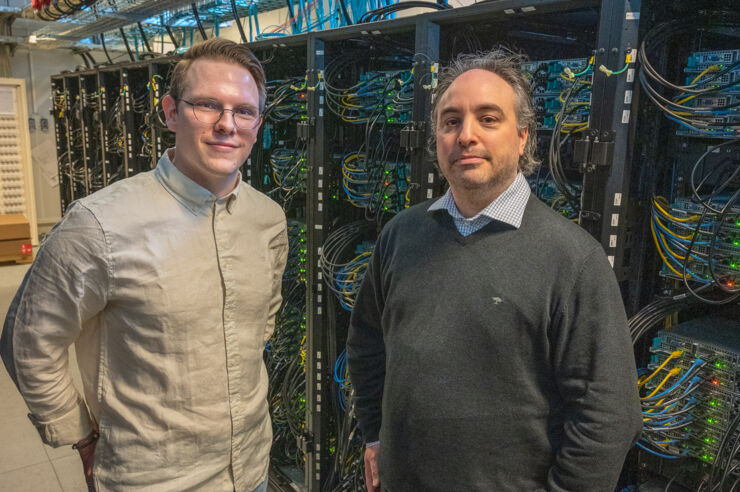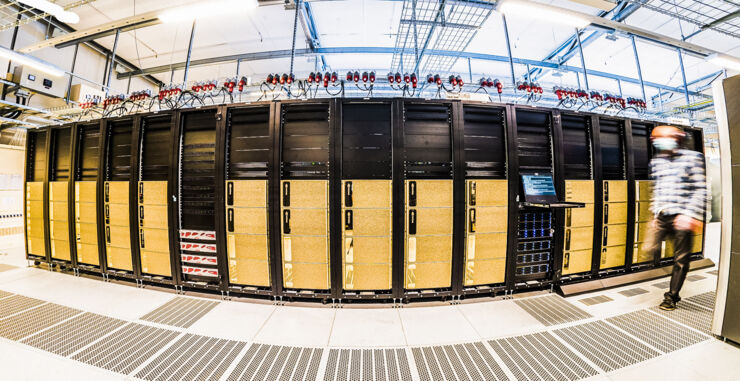
ΑΙhub.org
International collaboration lays the foundation for future AI for materials
 On the supercomputers at the National Supercomputer Center at Linköping University, researchers simulate how atoms in different materials behave. Data from such simulations is made available worldwide via the OPTIMADE standard to train future AI models for materials research. From left: Oskar Andersson, doctoral student, and Rickard Armiento, associate professor. Photo credit: Magnus Johansson.
On the supercomputers at the National Supercomputer Center at Linköping University, researchers simulate how atoms in different materials behave. Data from such simulations is made available worldwide via the OPTIMADE standard to train future AI models for materials research. From left: Oskar Andersson, doctoral student, and Rickard Armiento, associate professor. Photo credit: Magnus Johansson.
By Karin Söderlund Leifler
Artificial intelligence (AI) is accelerating the development of new materials. A prerequisite for AI in materials research is large-scale use and exchange of data on materials, which is facilitated by a broad international standard. A major international collaboration now presents an extended version of the OPTIMADE standard.
New technologies in areas such as energy and sustainability involving for example batteries, solar cells, LED lighting and biodegradable materials require new materials. Many researchers around the world are working to create materials that have not existed before. But there are major challenges in creating materials with the exact properties required, such as not containing environmentally hazardous substances and at the same time being durable enough to not break down.
“We’re now seeing an explosive development where researchers in materials science are adopting AI methods from other fields and also developing their own models to use in materials research. Using AI to predict properties of different materials opens up completely new possibilities,” says Rickard Armiento, associate professor at the Department of Physics, Chemistry and Biology (IFM) at Linköping University in Sweden.
AI that can make predictions
Today, many demanding simulations are performed on supercomputers that describe how electrons move in materials, which gives rise to different material properties. These advanced calculations yield large amounts of data that can be used to train machine learning models.
 The supercomputer Berzelius. Photo credit: Thor Balkhed
The supercomputer Berzelius. Photo credit: Thor Balkhed
These AI models can then immediately predict the responses to new calculations that have not yet been made, and by extension predict the properties of new materials. But huge amounts of data are required to train the models.
“We’re moving into an era where we want to train models on all data that exist,” says Rickard Armiento.
Data from large-scale simulations, and general data about materials, are collected in large databases. Over time, many such databases have emerged from different research groups and projects, like isolated islands in the sea. They work differently and often use properties that are defined in different ways.
“Researchers at universities or in industry who want to map materials on a large scale or want to train an AI model must retrieve information from these databases. Therefore, a standard is needed so that users can communicate with all these data libraries and understand the information they receive”, says Gian-Marco Rignanese, professor at the Institute of Condensed Matter and Nanosciences at UCLouvain in Belgium.
Worldwide collaboration
The OPTIMADE (Open databases integration for materials design) standard has been developed over the past eight years. Behind this standard is a large international network with over 30 institutions worldwide and large materials databases in Europe and the USA. The aim is to give users easier access to both leading and lesser-known materials databases. A new version of the standard, v1.2, is now being released, and is described in an article published in the journal Digital Discovery. One of the biggest changes in the new version is a greatly enhanced possibility to accurately describe different material properties and other data using common, well-founded definitions.
The international collaboration spans the EU, the UK, the US, Mexico, Japan and China together with institutions such as École Polytechnique Fédérale de Lausanne (EPFL), University of California Berkeley, University of Cambridge, Northwestern University, Duke University, Paul Scherrer Institut, and Johns Hopkins University. Much of the collaboration takes place in meetings with annual workshops funded by CECAM (Centre Européen de Calcul Atomique et Moléculaire) in Switzerland, with the first one funded by the Lorentz Center in the Netherlands. Other activities have been supported by the organisation Psi-k, the competence centre NCCR MARVEL in Switzerland, and the e-Science Research Centre (SeRC) in Sweden. The researchers in the collaboration receive support from many different financiers.
Read the research article in full
Developments and applications of the OPTIMADE API for materials discovery, design, and data exchange, Matthew L. Evans, Johan Bergsma, Andrius Merkys, Casper W. Andersen, Oskar B. Andersson, Daniel Beltrán, Evgeny Blokhin, Tara M. Boland, Rubén Castañeda Balderas, Kamal Choudhary, Alberto Díaz Díaz, Rodrigo Domínguez García, Hagen Eckert, Kristjan Eimre, María Elena Fuentes Montero, Adam M. Krajewski, Jens Jørgen Mortensen, José Manuel Nápoles Duarte, Jacob Pietryga, Ji Qi, Felipe de Jesús Trejo Carrillo, Antanas Vaitkus, Jusong Yu, Adam Zettel, Pedro Baptista de Castro, Johan Carlsson, Tiago F. T. Cerqueira, Simon Divilov, Hamidreza Hajiyani, Felix Hanke, Kevin Jose, Corey Oses, Janosh Riebesell, Jonathan Schmidt, Donald Winston, Christen Xie, Xiaoyu Yang, Sara Bonella, Silvana Botti, Stefano Curtarolo, Claudia Draxl, Luis Edmundo Fuentes Cobas, Adam Hospital, Zi-Kui Liu, Miguel A. L. Marques, Nicola Marzari, Andrew J. Morris, Shyue Ping Ong, Modesto Orozco, Kristin A. Persson, Kristian S. Thygesen, Chris Wolverton, Markus Scheidgen, Cormac Toher, Gareth J. Conduit, Giovanni Pizzi, Saulius Gražulis, Gian-Marco Rignanese and Rickard Armiento, Digital Discovery (2024).









